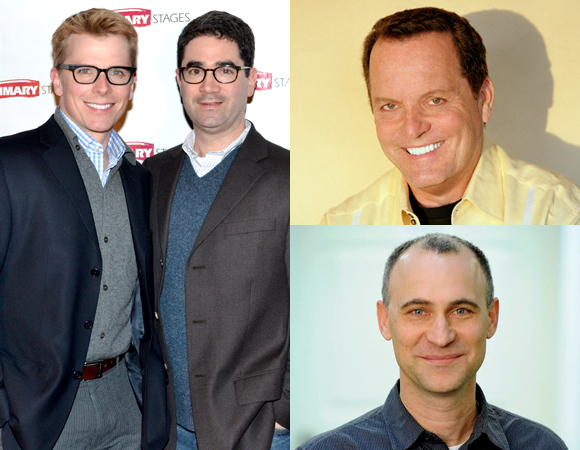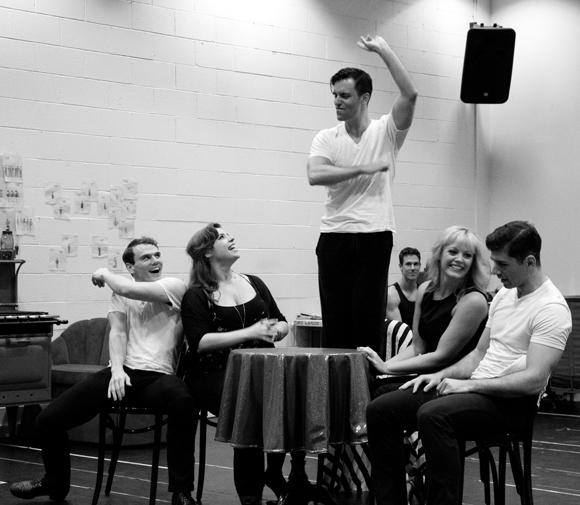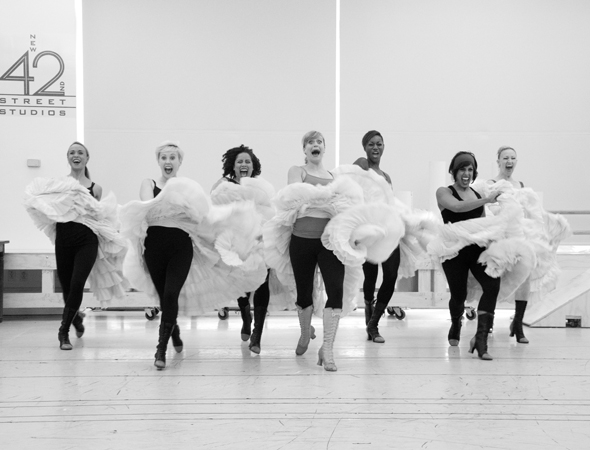Classic Musicals Can-Can and On the Town Get Refurbished Before Highly Anticipated Productions

(© David Gordon)
"Our goal," say the married playwrights Robert Cary and Jonathan Tolins, "is that we're hoping people will say 'they didn't touch the book.'" It's a noble goal for the pair, especially when the book they're officially credited as providing "additional material" for was written by the legendary team of Betty Comden and Adolph Green. Cary and Tolins are touching up some of Comden and Green's text for the new Broadway revival of On the Town, providing what the former calls "a combination of their voice and a little bit of what seventy years has done in terms of how comedy works." Though the two are quick to point out that they're not doing any structural work on the show.
It's almost the complete opposite for David Lee and Joel Fields who are doing a top-to-bottom sprucing up of Can-Can, the 1953 Cole Porter-Abe Burrows musical that comes to the Paper Mill Playhouse on October 1 before an expected Broadway bow. "I'd always loved the score and the characters, ever since I was a child. I saw it a couple of times and I somehow found it unsatisfying." His and Fields' goals were four-fold: to be as reverent to the original material as they could, to not "raid the Cole Porter songbook" for additional tunes, and, like Cary and Tolins, to leave the audience with "the feeling that they were watching some great revival of a wonderful classic musical, rather than watching what a couple of guys in 2014 did with it," Fields notes.
A self-resuscitating art form, musical theater frequently finds itself in the position of breeding just as many revisals as there are revivals. Many come and go, like Peter Parnell's critically drubbed 2011 reworking of On a Clear Day You Can See Forever, while certain others, like Peter Stone's politically correct 1999 Annie Get Your Gun, become the gold standard for future regional productions. And who can forget the Stephen Sondheim-led hubbub in 2012 over Suzan-Lori Parks' new script for Porgy and Bess, which, among other textual changes, added the moniker "The Gershwins'" before the title (leaving out the show's other authors, Dubose and Dorothy Heyward). And revisals aren't limited to Broadway. This season alone also finds regional productions of Gigi at the Kennedy Center, with a new book by Heidi Thomas, and Denver Theatre Center's The Unsinkable Molly Brown, featuring a new script by Dick Scanlan.
The reason for these revivals can almost always be directed to the idea of political correctness. Certain things that were acceptable in the 1940s and 1950s aren't necessarily still in the contemporary vernacular. Stone's revisions of Annie Get Your Gun, for example, removed pejoratives referring to the Native American characters from Herbert and Dorothy Fields' script. David Henry Hwang's revamped Flower Drum Song in 2002 excised Asian stereotypes from Oscar Hammerstein II's script. "There is a repertoire of classics that have always played the same and are constantly done," Tolins notes, "and I think there is a desire to slightly expand that list. But for whatever reason, passage of time or different sensibilities, the text may need someone to take a slightly fresh look."

(© David Gordon)
Cary adds that he and Tolins are "trying to be as inside the story and time period as Comden and Green." It was director John Rando who brought the script to Cary and Tolins after a production at Barrington Stage in 2013. Rando "wasn't able to make work the way it must have worked in 1944," Cary explained. "The show was written by people who had just come out of the sketch-comedy tradition, and sketch comedy can't be expected to work the same way after seventy years." However, if they find that things aren't "working better than the original did," they go back to the source. "We don't want to change something just for the purpose of changing it."
While Comden and Green's material in On the Town remains intact, only bits and pieces of what Abe Burrows crafted for Can-Can remain in the new libretto. "There's one scene that's completely Burrows," Lee says, "and other chunks of scenes that are his." As for the songs, "Everything that was in the original Broadway version is in this, plus one that we discovered on a recording of Cole Porter singing from the backers' audition." That song, called "Who Said Gay Paree?" now opens the second act. As Fields succinctly put it, "It became an interesting jigsaw puzzle as we added story and character elements, figuring out how we could make these songs work to propel the story and characters throughout the show."
The shows receiving revisals today come from a very specific period in the Golden Age of musicals. In "the era that followed immediately after Oklahoma! and Carousel were introduced, those authors were just catching up to this new way of storytelling," says Cary. Back then, "audiences didn't expect plotlines that have arcs that land and runners that pay off. This many decades later, people become fidgety when they're not finding things you plant early in the show blooming later on." In the end, he believes, "revisals that try to respectfully address the original material are just helping the shows more completely fulfill audiences' expectations of how a musical adventure happens."

(© David Gordon)












